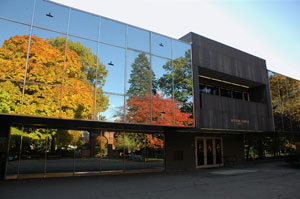- About Ramapo
- Academics
- Admissions & Aid
- Student Life
- Athletics
- Alumni
- Arts & Community
- Quick Links
- Apply
- Visit
- Give
Resources

The following documents and links provide resources, both institutional and external, to support academic assessment at Ramapo College. In some instances, a sample website from countless ones available on the internet is linked. In other instances, the page is under constant construction as new resources become available. The Ramapo community is encouraged to submit to CWAAC assessment resources for consideration.
Applying a Rubric
Programs may assess student learning in a variety of ways to yield meaningful results. However, some assessment methods have surfaced as especially useful ones for assessing student learning at Ramapo College. For example here is a widespread use of rubrics for assessment.
Closing the Loop
The most important part of any assessment process is closing the loop. Since its inception, Ramapo’s all-college assessment program has promoted loop-closing as vital to the continuous improvement of teaching and learning.
In an effort to enhance our loop-closing strategies,
CWAAC and the School Assessment Committees ask all academic programs:
- To indicate if an outcome assessed this year was assessed in the past
- To document if actions planned in response to a past assessment were actually taken
- To compare past with current assessment results
- To consider whether past actions had the desired effect and if any enhancements are warranted
Bibliography
Adelman, Cliff, et al. The Degree Qualifications Profile: A Learning-Centered Framework for What College Graduates Should Know and Be Able to Do to Earn the Associate, Bachelor’s, or Master’s Degree. Indianapolis: Lumina Foundation, 2014. Lumina Foundation for Education. Web. 22 September 2015. http://www.luminafoundation.org/files/resources/dqp.pdf.
Allen, Mary J. Assessing Academic Programs in Higher Education. San Francisco: Anker, 2004. Print.
—. Assessing General Education Programs. San Francisco: Anker, 2006. Print.
Association of American Colleges and Universities. Greater Expectations: A New Vision for Learning as a
Nation Goes to College. Washington, DC: AAC&U 2002. Print.
Barkley, Elizabeth F. and Claire Howell Major. Learning Assessment Techniques: A Handbook for College Faculty. San Francisco: Jossey-Bass, 2016. Print
Maki, Peggy. Assessing for Learning: Building a Sustainable Commitment across the Institution. Sterling,
VA: Stylus, 2004. Print.
Middle States Commission on Higher Education. Student Learning Assessment: Options and Resources.
Philadelphia: MSCHE, 2007. Middle States Commission on Higher Education. Web. 23 August 2010.
(Student Learning Assessment Options and Resources.pdf)
Suski, Linda. Assessing Student Learning: A Common Sense Guide. San Francisco: Jossey-Bass, 2018. Print
Conferences and Workshops
FAQ
Ramapo's Learning Outcomes
Essential Learning Outcomes
Ramapo College endorses the Essential Learning Outcomes, an outgrowth of AAC&U’s LEAP initiative.
All-College Learning Goals and Outcomes
The all-college goals and outcomes express what every Ramapo College student should know or be able to do upon graduation. All Ramapo goals and outcomes major, minor, and so forth should support the all-college goals and outcomes.
General Education Curriculum Map
Outcomes for Majors, Minors, and Graduate Programs can be found in the college College Catalog
Ramapo's Curriculum Maps
The following curriculum maps show the alignment between program courses and program outcomes in the majors, minors, graduate, and other programs at Ramapo College.
Majors
- Accounting
- African Studies
- American Studies
- Bachelor of Social Work
- Bachelor of Nursing
- Biochemistry
- Bioinformatics
- Biology
- Chemistry
- Computer Science
- Communication Arts
- Contemporary Arts
- Economics
- Engineering Physics
- English and Literary Studies
- Environmental Science
- Environmental Studies
- Finance
- History
- Information Technology
- Integrated Science Studies
- International Business
- International Studies
- Law and Society
- Liberal Studies
- MAEL
- Management
- Marketing
- Mathematics
- Music
- Philosophy
- Political Science
- Psychology
- Social Work
- Sociology
- Social-Science
- Sustainability
- Spanish
- Teacher Education
- Theater
- Visual Arts
Minors
Graduate Programs
- Master of Arts in Educational Leadership
- Masters in Social Work
- Master of Arts in Special Education
Other Programs
Vocabulary
Achievement target: The number, rate, percentage, and so forth that your program would consider an acceptable assessment finding.
Actions: What your program plans to do with your assessment results to improve teaching and learning or to improve your assessment methodology.
Assessment: A form of research designed to determine if students have in fact learned what our courses and other learning experiences are designed for them to learn.
Closing the Loop: responding to assessment results by implementing appropriate actions and determining if these actions improved student learning.
Curriculum map: A visual tool showing the alignment between program-level outcomes and program courses.
Direct assessment: An assessment of students’ actual learning, evaluating, for example, projects and performances.
Embedded assessment: An assessment using methods already available in a course, such as a question on an exam, a group project, or a demonstration.
Findings: Your actual assessment results.
Indirect assessment: Typically an assessment of students’ perceptions of their learning, using, for instance, focus groups and surveys.
Learning outcome: A succinct statement of what you would like students to know or be able to do. Sometimes called an objective, an outcome may also refer to an attitude or a disposition. An outcome is measurable.
Learning goal: A statement about student learning that is more general than an outcome.
Measure: The tool that you plan to use to assess your selected outcome.
Reassessment: Comparing assessment results over time to analyze trends and determine whether implemented actions improved students learning.
Rubric: An assessment tool that combines assessment criteria (e.g., correct grammar) with descriptions of different levels of achievement (e.g., meets expectations: a few non-distracting mechanical errors).
Triangulation: More than one piece of evidence comes to the same conclusion about student learning.
Copyright ©2025 Ramapo College Of New Jersey. Statements And Policies. Contact Webmaster.
